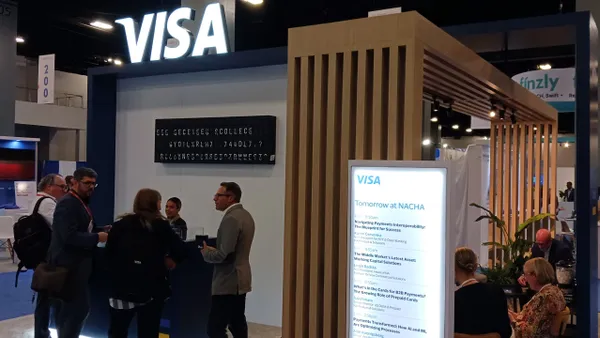Focusing on environmental, social and corporate governance principles isn’t a purely altruistic effort for card network company Mastercard. It’s also good business amid a competitive landscape, a company leader said this week.
The card giant’s approach is to “institutionalize ESG” across the company, Mastercard’s president of strategic growth, Michael Froman, said Monday during investment bank Morgan Stanley’s Sustainable Futures conference.
Pursuing such goals offers advantages when it comes to forging customer relationships or luring talent amid a tight labor market, Froman said.
Mastercard has focused on climate change and environmental issues not only because it’s the right thing to do, “but because it’s also key to attracting the best quality talent and retaining them." He added: "It’s key to developing closer relationships with customers who are also wrestling with these issues, and our capacity to partner with them is a comparative advantage."
Working toward financial inclusion means “our business will do well in the context of more inclusive economies,” Froman said. And focusing on people-related issues, like bridging the gender pay gap and increasing diversity, means “we’re going to have better talent around the table, we’re going to be better positioned to deal with a wide range of markets for our products,” Froman said.
In April, the No. 2 card company announced it was tying employee compensation to its ESG goals, following its 2021 move to link executive compensation to Mastercard’s performance on metrics like carbon neutrality and closing the gender pay gap.
The company now pays all of its employees partly based on “very specific, quantitative metrics – not just some general, feel-good, how do we think we’re doing on ESG?” question, Froman said.
Mastercard considers whether it’s achieving financial inclusion objectives, making progress toward net zero emissions and closing the gender pay gap. “That can affect all of our employees’ bonuses, positively or negatively,” Froman said.
“There’s nothing like compensation to get people’s attention,” he said, adding that “hundreds and hundreds” of employees have reached out to ask how they can help pursue the company’s goals.
“That is ultimately how you integrate this into the core of the business,” Froman said.
Froman, who said he’s spent about half of his adult life in the private sector and half in government, served as the U.S. trade representative in the Obama administration from 2013 to 2017, per Mastercard’s website.
In recent decades, the conversation around the role of corporations in society has shifted, Froman said. As governments have been less able deal with some of these critical ESG-related issues, “society has looked to other major institutions, including the private sector, to take on greater responsibility,” he said.
Injecting private-sector innovations into some of these broader issues “is going to have greater impact,” Froman added.
As a rash of companies have made net-zero commitments related to carbon emissions, Mastercard is seeking to provide products and services that address that interest, he said. “If we can come up with ESG products and services and help our banking partners, merchants, fintechs, governments achieve their ESG objectives, that’s good for business,” Froman said, noting a carbon calculator it launched last year with Swedish fintech Doconomy.
ESG pursuits have to be “genuine and authentic to the company,” which is why Mastercard initially focused on financial inclusion, he said. The company has laid out a goal of bringing 1 billion unbanked or underbanked people globally into the financial system by 2025, as well as 50 million micro and small merchants, and 25 million women-run businesses.











